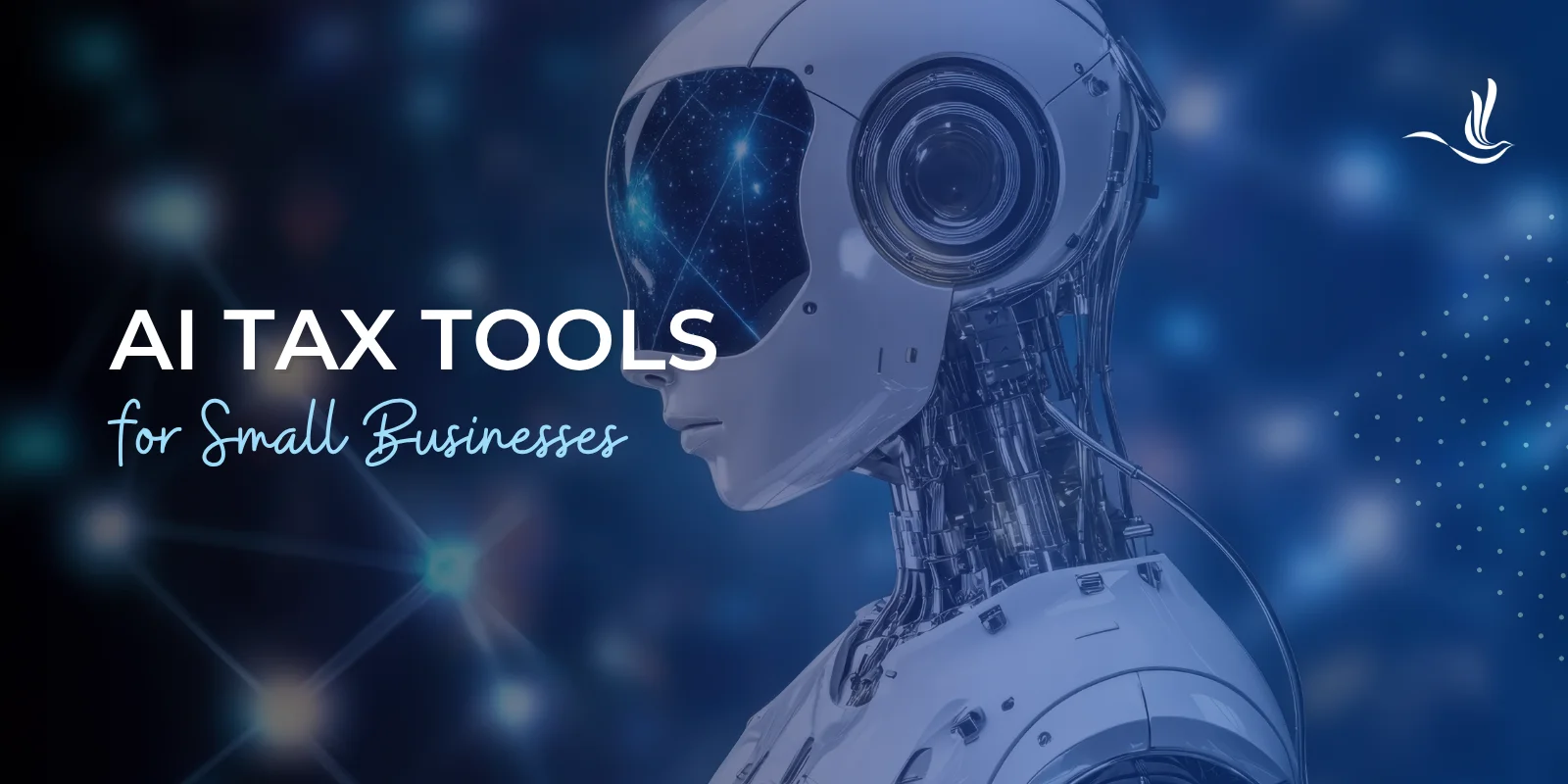Key Takeaways:
AI tax tools automate data entry, expense categorization, and reconciliation, saving small business owners significant time.
These tools improve accuracy and compliance by detecting errors, flagging inconsistencies, and keeping up with changing tax regulations.
Small business owners remain responsible for reviewing AI-generated data to ensure filings are accurate and complete.
Predictive analytics and real-time insights help businesses forecast tax liabilities, plan payments, and optimize deductions.
Adopting AI now gives small businesses a competitive edge, reducing administrative burdens and supporting smarter growth decisions.
Artificial intelligence (AI) is reshaping the way small businesses handle taxes. What used to require hours of manual data entry, form-checking, and compliance tracking can now be automated and analyzed with remarkable accuracy. AI-powered tax tools give small business owners the power to simplify filing, minimize errors, and stay compliant, without needing to become tax experts themselves.
In this guide, we’ll explain what AI tax tools are, how they work, their key benefits, and how small business owners can use them effectively to save time, reduce costs, and improve accuracy.
What Are AI Tax Tools?
AI tax tools are software applications that use artificial intelligence, particularly machine learning, automation, and predictive analytics, to help manage tax-related tasks.
Unlike traditional tax software that relies on manual input, AI-driven platforms learn from your data and automate decision-making processes. These tools can read receipts, categorize expenses, spot errors, and even predict tax liabilities before you file.
How AI Tax Tools Differ from Traditional Software
Traditional tax tools require you to enter all your financial information manually. For example, if you upload a stack of expense receipts, you must categorize each one by hand; office supplies, travel, meals, etc.
AI-powered tools go several steps further:
They use optical character recognition (OCR) to extract data from receipts or invoices automatically.
They learn your spending patterns and suggest the correct expense categories.
They cross-check entries against IRS regulations to flag potential issues or missed deductions.
This not only saves time but reduces costly human error; one of the most common causes of IRS notices for small businesses.
Let’s look at an example. Let’s say your business uses a corporate card for multiple employees. AI tax software can automatically categorize each transaction based on historical behavior, flag outliers (like a purchase that doesn’t fit normal spending), and sync those insights directly into your tax reports.
The result? Real-time tax readiness with minimal manual effort.
Why Small Businesses Should Consider AI for Taxes
Managing taxes can be one of the most stressful aspects of running a small business. Between tracking receipts, understanding new regulations, and staying audit-ready, the process can easily consume valuable time that could be better spent on operations or growth.
That’s where AI tax tools for small businesses deliver major benefits.
1. Reduce Manual Workload
AI handles repetitive tasks like data entry, expense categorization, and reconciliation automatically. This allows small business owners and bookkeepers to focus on strategy instead of spreadsheets.
For instance, an AI tool can automatically pull data from connected accounts, identify tax-deductible expenses, and populate relevant tax forms, saving hours every month.
2. Improve Accuracy and Compliance
AI doesn’t get tired or distracted. It continuously scans transactions for inconsistencies or red flags that could trigger an audit. Many tools also update automatically when tax laws change, helping you stay compliant without manually tracking regulation changes.
3. Save Money and Avoid Penalties
Missed deductions and filing errors cost small businesses thousands every year. AI tools reduce that risk by identifying every potential write-off and minimizing human oversight errors.
4. Get Real-Time Financial Insights
Instead of waiting until tax season to understand your financial position, AI tax tools provide real-time insights into cash flow and liabilities. This helps you plan ahead, avoid surprises, and make smarter financial decisions throughout the year.
Common Use Cases of AI in Small Business Taxation
AI technology is more than just a filing assistant; it can enhance nearly every stage of your tax process. Below are some of the most impactful use cases.
Expense Categorization and Data Entry Automation
AI tools use machine learning to automatically sort expenses into categories that align with IRS rules. For example, if your business regularly books rideshares for client meetings, the software will learn to classify those under travel or transportation.
This eliminates manual entry errors and ensures consistency across your books.
Tax Filing and Compliance Assistance
Some AI tax tools can prefill forms, such as Form 1120-S for S corporations or Schedule C for sole proprietors. Others check for missing data or inconsistencies before submission. By streamlining preparation and reducing manual review, AI ensures filings are accurate, timely, and aligned with the latest tax rules.
Forecasting and Tax Planning
AI goes beyond filing; it helps you plan for future liabilities. Predictive analytics can estimate quarterly payments or forecast how certain business decisions (like hiring new staff or buying equipment) might affect your tax burden.
These insights allow you to set aside funds and avoid underpayment penalties.
Audit Support and Fraud Detection
AI can scan for unusual spending patterns, duplicate invoices, or inconsistent entries that may raise red flags during an audit. By catching these early, you can fix potential issues before they escalate.
Integration with Accounting Platforms
Most AI tax tools integrate directly with popular accounting systems like QuickBooks, Xero, and FreshBooks. This ensures your financial data flows seamlessly between platforms, reducing duplicate entries and maintaining a single source of truth.
Key Features to Look for in AI Tax Software
Not all AI tools are created equally. Choosing the right one depends on your business’s size, industry, and existing accounting setup. Here are the most important features to look for.
Automation and Data Extraction
AI tax tools with OCR (Optical Character Recognition) can read receipts, invoices, and bank statements automatically. This feature saves time and reduces transcription errors.
Error Detection and Audit Trails
Look for software that offers built-in compliance checks. These systems compare your entries against tax codes and provide audit trails that make it easy to track any changes or corrections.
Real-Time Tax Updates
Tax laws change frequently. Choose tools that update automatically when federal or state tax rules shift so you can file with confidence.
Integration and Cloud Access
Cloud-based tools are ideal for small businesses with remote teams or outsourced accountants. Integration ensures all your data, bookkeeping, payroll, and tax, works together without manual syncing.
Security and Data Protection
Since tax data includes sensitive financial information, ensure the tool complies with major security standards. Look for encryption, multi-factor authentication, and secure data storage.
Implementation Tips: How to Integrate AI Tax Tools Into Your Workflow
Transitioning to AI tax software doesn’t have to be complicated. A structured approach ensures smoother adoption and maximum ROI.
Start Small
Begin by integrating AI features into your existing accounting platform. For example, you might start with automatic expense categorization or receipt scanning before moving on to full automation.
Train Your Team
Even the best AI tool is only as effective as its users. Offer short training sessions to familiarize staff with the platform. Encourage employees to review AI suggestions and learn from its logic.
Review Outputs Regularly
AI systems improve over time, but they still need human oversight. Periodically review categorized expenses, flagged errors, and deduction recommendations to ensure accuracy.
Track ROI and Efficiency Gains
Measure time savings, accuracy improvements, and cost reductions after implementing AI tools. These tools can help reduce accounting hours, prevent costly filing mistakes, and even uncover new deductions; making them a worthwhile investment for most small businesses.
Common Challenges and How to Overcome Them
While AI offers enormous potential, small business owners may encounter a few hurdles during implementation. Here’s how to address them.
Learning Curve
It takes time to adjust to a new system. Choose AI tax software with intuitive dashboards, guided onboarding, and responsive customer support.
Data Privacy Concerns
Always verify that your provider meets strict data security standards. Ask about encryption, storage policies, and compliance certifications before purchasing.
Over-Reliance on Automation
AI can streamline your workflow, but it shouldn’t replace human judgment. Always review AI-generated results for accuracy, especially before filing.
Why Small Businesses Should Consider AI for Taxes & The Future of AI in Small Business Tax Preparation
Managing taxes can be one of the most stressful aspects of running a small business. Between tracking receipts, understanding new regulations, and staying audit-ready, the process can easily consume valuable time that could be better spent on operations or growth.
AI tax tools offer small business owners the ability to streamline processes, reduce errors, and gain real-time insights. They are no longer a futuristic concept; they are here now and increasingly accessible, helping businesses save time, reduce costs, and make smarter financial decisions.
Key Benefits of AI Tax Tools
Reduce Manual Workload: Automates repetitive tasks like data entry, expense categorization, and reconciliation.
Improve Accuracy and Compliance: Continuously checks entries against IRS rules and flags potential issues.
Save Money and Avoid Penalties: Identifies deductions and reduces filing mistakes that can be costly.
Get Real-Time Financial Insights: Provides forecasting and predictive analytics for smarter tax planning.
User Responsibility
Even though AI tools automate many tax tasks, small business owners remain legally responsible for the accuracy of their filings. AI is designed to assist, not replace human oversight. Regularly reviewing AI-generated suggestions, categorized expenses, and deductions ensures compliance and protects your business from errors or IRS penalties.
The Future of AI in Small Business Tax Preparation
AI technology is advancing rapidly, and the next generation of tax tools promises even greater efficiency. Generative AI can answer complex tax questions, provide tailored advice, and draft explanations for IRS correspondence. Predictive compliance features will proactively alert you to potential filing risks or missed obligations months in advance.
By adopting AI tax tools now, small business owners can stay ahead of regulatory changes, optimize tax planning, and focus more on growing their business rather than getting bogged down in paperwork.
Frequently Asked Questions
How do AI tax tools help small businesses save time?
AI tax tools automate repetitive tasks like data entry, expense categorization, and reconciliation, reducing manual work and freeing business owners to focus on operations.
Are AI tax tools accurate and reliable?
AI tax tools are highly accurate for processing financial data and identifying errors, but users should always review AI-generated results to ensure compliance and avoid mistakes.
Can AI tools identify tax deductions I might miss?
Yes, AI tools can analyze expenses and transactions to highlight potential deductions, helping small businesses maximize tax savings while reducing the risk of oversight.
Do small business owners still need human oversight when using AI tax tools?
Yes, while AI streamlines many tasks, business owners are legally responsible for their filings, so reviewing AI outputs ensures accuracy and compliance with tax regulations.
Tax Help for Small Businesses
Whether you’re managing taxes in-house or with a professional firm, adopting AI-powered tools can transform your workflow and give you more time to focus on what really matter, growing your business. Optima Tax Relief is the nation’s leading tax resolution firm with over a decade of experience helping taxpayers.
If You Need Tax Help, Contact Us Today for a Free Consultation


























